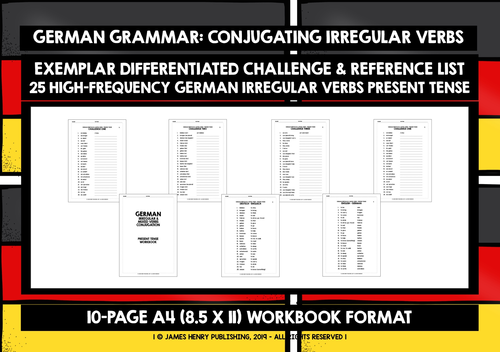



DAZ DAF BEGINNER GERMAN INTERMEDIATE GERMAN PRESENT TENSE IRREGULAR VERBS CONJUGATION PRACTICE
This resource consists of non-editable files in a zipped format. It is copyright, all rights reserved. It may not be copied, rewritten, shared or distributed in any way, in whole or in part, outside your own classroom in any way. The license for purchase is a single-user license only. Please read the Terms of Use carefully.
My students have always found these quick conjugation activities really useful as both a practice and revision activity. The focus in on 25 high-frequency irregular and mixed German verbs, with 150 ‘quick’ conjugations in the present tense. I use the workbooks in a range of learning contexts, such as independent work either in class time or at home, holiday refresher work, or individual activities for sub lessons. My students like to have several opportunities to work through the workbook, a couple of times a semester across a whole school year. This helps them to map progress in a very clear and structured way. .
The workbook has ten pages with the following structure:
Two alphabetical verb reference lists: German-English and English-German.
Three conjugation challenges, each with 50 individual conjugations:
Conjugation Challenge One: each verb conjugated in German across a range of pronouns, with students writing the corresponding English verb conjugation.
Conjugation Challenge Two: gives the infinitive of each verb in German, specifying the target pronoun. Students write the corresponding verb conjugation in German.
Conjugation Challenge Three: students write the corresponding German verb conjugation, and its infinitive, from an English prompt.
Notes and Next Steps sheet, which encourages students to think about how their understanding of German conjugation works, what progress they have made, what their targets for improvement might realistically be, and what they might reasonably do in order to meet those targets. We use this a lot to inform our whole-group discussions about conjugation and German grammar in general.
answer key which my students find really useful, either to self- or peer-assess - answer keys are also great time-saver for teachers, as well as a way of encouraging students to really assume more responsibility for, and independence in, their learning.
Try this quick conjugation workbook sampler to see if it’s the kind of learning activity that will work well for your students - it’s free to download here:
GERMAN CONJUGATION PRACTICE SAMPLER
https://www.tes.com/teaching-resource/german-conjugation-drills-sampler-12149140
Have a browse in my store for more German grammar activities, and a wide range of other German teaching and learning resources, with lots of freebies.
VIELEN DANK UND VIEL SPAß BEIM KONJUGIEREN!
Something went wrong, please try again later.
This resource hasn't been reviewed yet
To ensure quality for our reviews, only customers who have purchased this resource can review it
Report this resourceto let us know if it violates our terms and conditions.
Our customer service team will review your report and will be in touch.